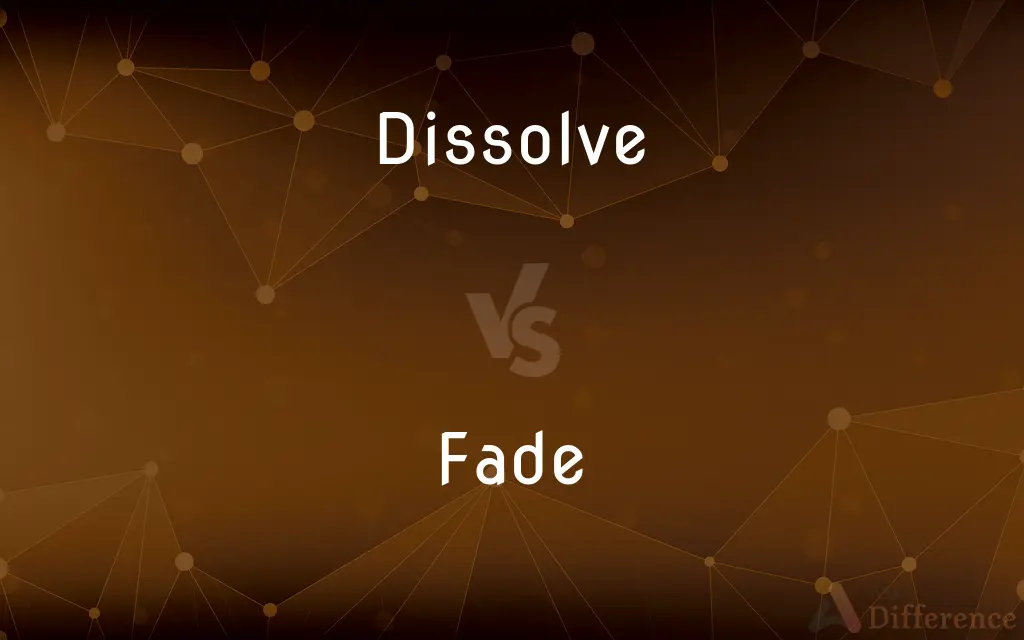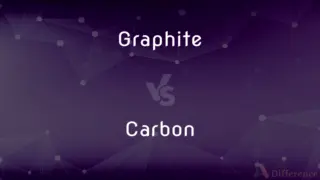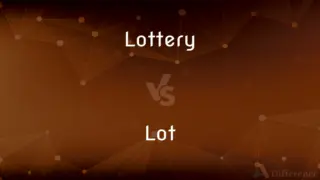Dissolve vs. Fade — What's the Difference?
By Urooj Arif & Fiza Rafique — Updated on March 29, 2024
Dissolve transitions between two scenes by gradually overlaying the end of one scene with the beginning of another, while a fade involves a scene gradually turning to a single color, typically black or white.

Difference Between Dissolve and Fade
Table of Contents
ADVERTISEMENT
Key Differences
In video editing and cinematography, a dissolve is a technique used to transition between two scenes, where the first scene gradually becomes less visible while the second scene becomes more visible, overlapping for a brief period. On the other hand, a fade is a type of transition where a scene either fades in from a black or white screen (fade in) or fades out to a black or white screen (fade out), signifying the beginning or end of a sequence, a change in time, or a significant shift in location.
Dissolves are often used to show parallel action or to soften the jump from one scene to another, making the transition less jarring than a cut. Fades, especially fade-outs, are frequently employed to conclude a story or a scene, indicating finality, or a fade-in to gently introduce the audience to the story world. Fades can also imply a longer passage of time than dissolves.
The emotional impact of these transitions can vary: dissolves might create a sense of continuity or narrative linkage, suggesting a closer relationship between the scenes. Fades, by contrast, can evoke a range of feelings from calmness (with a slow fade-in) to a sense of closure or even melancholy (with a slow fade-out), depending on their context and how they are used within the narrative.
Both techniques are tools in the filmmaker's repertoire, chosen for their ability to convey mood, time passage, and narrative flow. However, the choice between a dissolve and a fade (and their variations like fade to black, fade to white) depends on the story being told, the emotional nuance the director wishes to convey, and the overall pacing of the film or video project.
Comparison Chart
Definition
Transition between two scenes with overlapping images.
Gradual transition to/from a single color.
ADVERTISEMENT
Usage
Suggests a connection or passage of time.
Indicates beginning/end of a sequence, time change.
Visual Effect
Both scenes visible for a brief period.
Scene transitions to/from black or white.
Emotional Impact
Creates continuity or narrative linkage.
Evokes calmness, closure, or melancholy.
Typical Context
Used in narratives to show parallel actions.
Used at the opening or closing of scenes or stories.
Compare with Definitions
Dissolve
A gradual transition that overlays the end of one scene with the beginning of another.
The film used a dissolve to transition from the bustling city scene to the quiet countryside.
Fade
A scene fades to or from black or white, indicating transitions.
The movie opened with a fade in from black to a sunrise scene.
Dissolve
Often signifies a connection or narrative link.
Dissolves were used to connect the protagonist’s past and present.
Fade
Can indicate a significant time change.
A fade to black was used before showing the characters several years later.
Dissolve
Suggests parallel action or time passage.
A series of dissolves depicted the team's progress over the months.
Fade
Evokes emotions like calmness or melancholy.
The slow fade out of the final scene left the audience in reflective silence.
Dissolve
Softens the jump between scenes.
The dissolve between the argument and the reconciliation scene underscored the passage of time.
Fade
Marks a change in location or context.
The fade to white transitioned the narrative from reality to the protagonist’s dream.
Dissolve
Creates a smooth narrative flow.
The documentary utilized dissolves to seamlessly connect different interviews.
Fade
Used to signify the end or beginning of a story.
The final scene faded to black, signaling the story's conclusion.
Dissolve
To cause to pass into solution
Dissolve salt in water.
Fade
To lose brightness, loudness, or brilliance gradually
The lights and music faded as we set sail from the harbor.
Dissolve
To reduce (solid matter) to liquid form; melt.
Fade
To lose freshness; wither
Summer flowers that had faded.
Dissolve
To cause to lose definition; blend or blur
"Morality has finally been dissolved in pity" (Leslie Fiedler).
Fade
To lose strength or vitality; wane
Youthful energy that had faded over the years.
Dissolve
To cause to disappear or vanish; dispel
The sun dissolved the fog. That remark dissolved the tension in the room.
Fade
To disappear gradually; vanish
A hope that faded.
Dissolve
To break into component parts; disintegrate
The deal dissolved the company into three separate businesses.
Fade
(Sports) To swerve from a straight course, especially in the direction of a slice.
Dissolve
To bring to an end, as by breaking up; terminate or annul
"General de Gaulle was returned to power ... with a mandate to dissolve an overseas empire that had turned into a nightmare" (Alison Jolly).
Fade
(Football) To move back from the line of scrimmage. Used of a quarterback.
Dissolve
To dismiss (an assembly such as a legislative body).
Fade
To cause to lose brightness, freshness, or strength
Exposure to sunlight has faded the carpet.
Dissolve
To cause to be moved emotionally or upset.
Fade
(Sports) To hit (a golf ball, for instance) with a moderate, usually controlled slice.
Dissolve
To pass into solution
Salt dissolves easily in water.
Fade
(Games) To meet the bet of (an opposing player) in dice.
Dissolve
To become liquid; melt
The clumps of snow dissolved into puddles.
Fade
The act of fading.
Dissolve
To lose definition; become blurred or indistinguishable
"The last shadows have dissolved into darkness" (Daniel Blajan).
Fade
A gradual dimming or increase in the brightness or loudness of a light source or audio signal.
Dissolve
To become disintegrated; disappear
The mist dissolves as the sun rises.
Fade
A transition in a cinematic work or slide presentation in which the image gradually appears on or disappears from a blank screen.
Dissolve
To be broken up into separate parts
The empire dissolved into many separate countries.
Fade
(Sports) A moderate, usually controlled slice, as in golf.
Dissolve
To be brought to an end; be annulled or terminated
After a long separation, the marriage finally dissolved.
Fade
A control mechanism on a stereo that adjusts the distribution of power between the front and rear channels.
Dissolve
To be moved or overcome emotionally
I dissolved into helpless laughter.
Fade
A style of haircut in which the hair is cut close to the sides and back of the head and trimmed to result in gradually longer lengths toward the top of the head.
Dissolve
To make a transition between shots in a cinematic work using a superimposition in which the first shot fades out while the second shot gradually appears.
Fade
(archaic) Weak; insipid; tasteless.
Dissolve
A transition in a cinematic work consisting of a superimposition in which the first shot fades out while the second shot gradually appears. Also called lap dissolve.
Fade
(archaic) Strong; bold; doughty.
Dissolve
(transitive) To terminate a union of multiple members actively, as by disbanding.
The ruling party or coalition sometimes dissolves parliament early when the polls are favorable, hoping to reconvene with a larger majority.
Fade
(golf) A golf shot that curves intentionally to the player's right (if they are right-handed) or to the left (if left-handed).
Dissolve
(transitive) To destroy, make disappear.
Fade
A haircut where the hair is short or shaved on the sides of the head and longer on top. See also high-top fade and low fade.
Dissolve
(transitive) To liquify, melt into a fluid.
Fade
(slang) A fight.
Dissolve
(intransitive) To be melted, changed into a fluid.
Fade
A gradual decrease in the brightness of a shot or the volume of sound or music (as a means of cutting to a new scene or starting a new song).
Dissolve
To disintegrate chemically into a solution by immersion into a liquid or gas.
Fade
(slang) The act of disappearing from a place so as not to be found; covert departure.
Dissolve
To be disintegrated by such immersion.
Fade
To hit the ball with the shot called a fade.
Dissolve
(transitive) To disperse, drive apart a group of persons.
Fade
(intransitive) To grow weak; to lose strength; to decay; to perish gradually; to wither, as a plant.
Dissolve
(transitive) To break the continuity of; to disconnect; to loosen; to undo; to separate.
Fade
(intransitive) To lose freshness, color, or brightness; to become faint in hue or tint; hence, to be wanting in color.
Dissolve
To annul; to rescind; to discharge or release.
To dissolve an injunction
Fade
(intransitive) To sink away; to disappear gradually; to grow dim; to vanish.
The milkman's whistling faded into the distance.
Dissolve
To shift from one shot to another by having the former fade out as the latter fades in.
Fade
(transitive) To cause to fade.
Dissolve
(intransitive) To resolve itself as by dissolution.
Fade
To bet against (someone).
Dissolve
(obsolete) To solve; to clear up; to resolve.
Fade
Weak; insipid; tasteless; commonplace.
His masculine taste gave him a sense of something fade and ludicrous.
Dissolve
To relax by pleasure; to make powerless.
Fade
To become fade; to grow weak; to lose strength; to decay; to perish gradually; to wither, as a plant.
The earth mourneth and fadeth away.
Dissolve
(cinematography) a form of film punctuation in which there is a gradual transition from one scene to the next
Fade
To lose freshness, color, or brightness; to become faint in hue or tint; hence, to be wanting in color.
Dissolve
To separate into competent parts; to disorganize; to break up; hence, to bring to an end by separating the parts, sundering a relation, etc.; to terminate; to destroy; to deprive of force; as, to dissolve a partnership; to dissolve Parliament.
Lest his ungoverned rage dissolve the life.
Fade
To sink away; to disappear gradually; to grow dim; to vanish.
The stars shall fade away.
He makes a swanlike end,Fading in music.
Dissolve
To break the continuity of; to disconnect; to disunite; to sunder; to loosen; to undo; to separate.
Nothing can dissolve us.
Down fell the duke, his joints dissolved asunder.
For one people to dissolve the political bands which have connected them with another.
Fade
To cause to wither; to deprive of freshness or vigor; to wear away.
No winter could his laurels fade.
Dissolve
To convert into a liquid by means of heat, moisture, etc.,; to melt; to liquefy; to soften.
As if the world were all dissolved to tears.
Fade
A golf shot that curves to the right for a right-handed golfer;
He took lessons to cure his slicing
Dissolve
To solve; to clear up; to resolve.
Make interpretations and dissolve doubts.
Fade
Gradually ceasing to be visible
Dissolve
To relax by pleasure; to make powerless.
Angels dissolved in hallelujahs lie.
Fade
Become less clearly visible or distinguishable; disappear gradually or seemingly;
The scene begins to fade
The tree trunks are melting into the forest at dusk
Dissolve
To annul; to rescind; to discharge or release; as, to dissolve an injunction.
Fade
Lose freshness, vigor, or vitality;
Her bloom was fading
Dissolve
To waste away; to be dissipated; to be decomposed or broken up.
Fade
Disappear gradually;
The pain eventually passed off
Dissolve
To become fluid; to be melted; to be liquefied.
A figureTrenched in ice, which with an hour's heatDissolves to water, and doth lose his form.
Fade
Become feeble;
The prisoner has be languishing for years in the dungeon
Dissolve
To fade away; to fall to nothing; to lose power.
The charm dissolves apace.
Dissolve
(film) a gradual transition from one scene to the next; the next scene is gradually superimposed as the former scene fades out
Dissolve
Cause to go into a solution;
The recipe says that we should dissolve a cup of sugar in two cups of water
Dissolve
Pass into a solution;
The sugar quickly dissolved in the coffee
Dissolve
Become weaker;
The sound faded out
Dissolve
Come to an end;
Their marriage dissolved
The tobacco monopoly broke up
Dissolve
Stop functioning or cohering as a unit;
The political wing of the party dissolved after much internal fighting
Dissolve
Cause to lose control emotionally;
The news dissolved her into tears
Dissolve
Lose control emotionally;
She dissolved into tears when she heard that she had lost all her savings in the pyramid scheme
Dissolve
Cause to fade away;
Dissolve a shot or a picture
Dissolve
Become or cause to become soft or liquid;
The sun melted the ice
The ice thawed
The ice cream melted
The heat melted the wax
The giant iceberg dissolved over the years during the global warming phase
Dethaw the meat
Dissolve
Bring the association of to an end or cause to break up;
The decree officially dissolved the marriage
The judge dissolved the tobacco company
Dissolve
Declare void;
The President dissolved the parliament and called for new elections
Common Curiosities
What emotions can a slow fade evoke?
Depending on context, a slow fade can evoke calmness, sadness, reflection, or a sense of closure.
How does a fade differ from a dissolve?
A fade involves a scene gradually turning to or from a single color, indicating a start or end of a sequence, unlike a dissolve which overlays two scenes.
Can dissolves and fades be used together in a film?
Yes, both can be used in the same film to convey different narrative or emotional transitions.
How do dissolves affect the pacing of a film?
They can create a smoother, more reflective pacing, allowing the audience to process the narrative connection between scenes.
When is a fade to black most commonly used?
At the end of a scene or sequence, to signal conclusion or a significant time gap.
Is a dissolve a good way to show time passing?
Yes, dissolves can effectively indicate the passage of time or link parallel narratives.
Can a fade be used in the middle of a film?
Yes, fades can be used at any point to indicate transitions in time, location, or to separate segments of the story.
What is the purpose of a dissolve in film?
To transition smoothly between two scenes, often to suggest a passage of time or a narrative connection.
What technical considerations might influence the choice between a dissolve and a fade?
The overall pacing, the emotional tone of the scene, and how the transition affects narrative clarity and viewer engagement.
Why might a filmmaker choose a fade to white instead of a fade to black?
A fade to white can suggest ambiguity, a transition to a dream or memory, or a more optimistic tone, as opposed to the finality often implied by a fade to black.
Share Your Discovery

Previous Comparison
Graphite vs. Carbon
Next Comparison
Lottery vs. LotAuthor Spotlight
Written by
Urooj ArifUrooj is a skilled content writer at Ask Difference, known for her exceptional ability to simplify complex topics into engaging and informative content. With a passion for research and a flair for clear, concise writing, she consistently delivers articles that resonate with our diverse audience.
Co-written by
Fiza RafiqueFiza Rafique is a skilled content writer at AskDifference.com, where she meticulously refines and enhances written pieces. Drawing from her vast editorial expertise, Fiza ensures clarity, accuracy, and precision in every article. Passionate about language, she continually seeks to elevate the quality of content for readers worldwide.















































